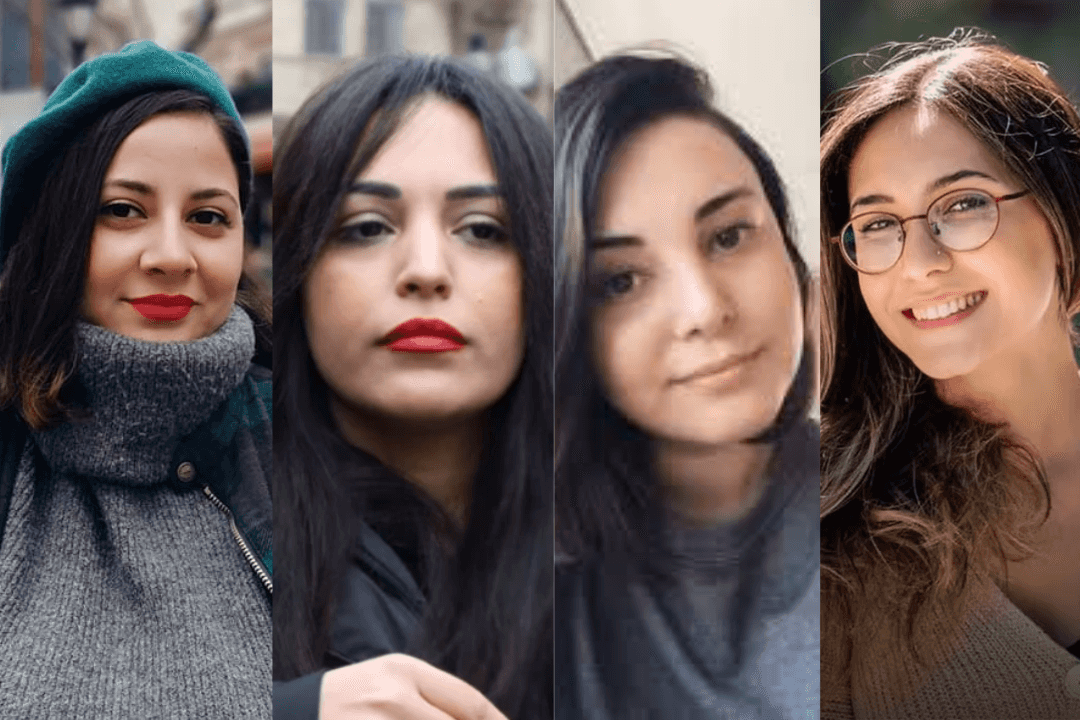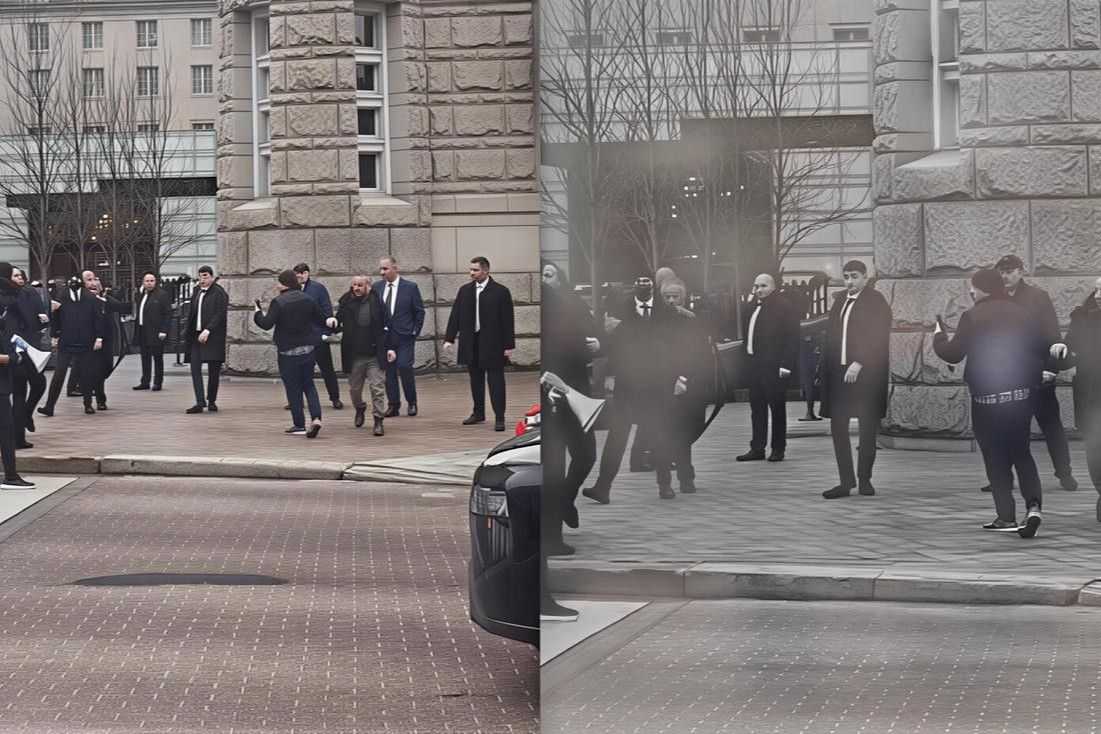
As tensions with Iran have increased, so have the risks of being a Muslim activist in Azerbaijan. Faced with a lack of evidence, however, Azerbaijani authorities have looked at other ways, from intimidation to false drug charges, to get the results they want.
On 26 October, Ahsan Nuruzada, a member of the Muslim Unity Movement, a religious opposition group in Azerbaijan, was detained by four men in civilian clothing.
For the next three days, Nuruzada’s family had no idea of his whereabouts. It wasn’t until 29 October that he was located — as a defendant at the Narimanov District Court in Baku facing charges of acquiring, transporting, or storing drugs in quantities for personal consumption.
Nuruzada had only been out of prison for 21 days before he was detained again, having been previously convicted of drug possession in October 2017. While imprisoned, his wife died of cancer, leaving their two daughters to be raised by Nuruzada’s elderly mother.
During the ensuing trial in late October, Nuruzada denied the drug charges. His lawyer, Fakhraddin Mehtiyev, also brought attention to Nuruzada’s health conditions, including heart and kidney problems, and his duty of care to his daughters.
Even so, Nuruzada was sentenced to one month and 28 days in prison, after which he will be sent for compulsory treatment at a drug addiction treatment centre.
Nuruzade is not the only member of the Muslim Unity Movement to have been arrested in recent months.
Previously, on 26 July, Namig Shirinov disappeared while working as a taxi driver, Muslim Unity Movement spokesperson Abulfaz Bunyadov told OC Media.
That day, at around noon, Shirinov made a call to a friend, after which no one was able to contact him. Calls to police, the Interior Ministry, and the Public Defender produced no result.
On 31 July, Shirinov re-appeared at a pre-trial detention centre in Baku.
Pro-government media initially reported that Shirinov was arrested for collecting money for the families of Azerbaijanis convicted of spying for Iran. However, on 6 August, the authorities announced that he had been arrested on charges of acquiring, transporting, or possessing drugs with the aim of selling them, and Shirinov was remanded to four months of pre-trial detention. His case is on-going.
The third wave of an ongoing crackdown
Nuruzada and Shirinov were both detained in what Bunyadov claims is the third wave in a series of crackdowns on the Muslim Unity Movement.
‘The first happened in 2015 when Tale Baghirzada and others were arrested. After that, in 2017, the arrests resumed, and the third phase began in 2020 and is still ongoing’, says Bunyadov, who is currently serving a 15-year sentence under house arrest, the lesser sentence given due to injuries sustained during his arrest.
The Muslim Unity Movement was founded in February 2015 by Baghirzada in response to the frequent arrests of Shia Muslims. Baghirzada, who had studied in Iran, gained fame amongst Azerbaijani Shia Muslims for both his sermons and his criticisms of President Ilham Aliyev.
He was arrested in May 2011 for participating in a protest against a government ban on high school students wearing the hijab, and subsequently sentenced to 18 months in jail on charges of hooliganism and resisting the police.
Two years later, he was arrested again, this time after declaring in a sermon that ‘a believer should not be afraid to raise his voice in protest against oppressors’.
After eight months of pre-trial detention, he was sentenced to two years in prison on charges of drug possession. While incarcerated, Baghirzada joined the National Council of Democratic Forces (NCDF), an attempt to unite opposition groups to run in the 2013 presidential elections against Aliyev.
After his release, Baghirzada was once again detained in November 2015, on charges of planning an armed coup with the intent of establishing ‘a religious state governed by Sharia law’. During the police operation, seven people were killed, including two police officers.
He was found guilty of premeditated murder and terrorism, as well as inciting religious hatred and organising riots, and in 2017 was sentenced to 20 years in prison, alongside 19 others.
In the years since, many more members of the movement have been detained, often on drug charges.
‘Right now, from our Muslim Unity [Movement] alone, 77 people are under arrest and 64 of them are imprisoned and the rest are in pre-trial detention’, Bunyadov told OC Media.
He added that the movement had several times applied to register as an official religious group, but had been rejected on every occasion.
Such targeting, however, has extended beyond just the Muslim Unity Movement. In late July, 11 members of the Ahmadi Religion of Peace and Light, a religious movement derived from Twelver Shia Islam, were detained in Baku for gathering in public. A month later, two of the movement’s members were sentenced to 30 days of administrative arrest on charges of hooliganism and resisting police.
A member of the group who asked to remain anonymous told OC Media that the two members had been beaten by police while under arrest.
According to MeydanTV, at least 500 religious or religiously-affiliated people have been arrested since the beginning of 2023, while Azerbaijan’s Union for Freedom of Political Prisoners announced in March that at least 208 religious believers are currently in prison on politically-motivated charges.
[Read on OC Media: Opinion | First they came for the Muslims, and we did not speak out…]
External observers have also confirmed Azerbaijan’s intolerance towards religious figures, with the US in December 2023 placing Azerbaijan on a watch list for ‘having engaged in or tolerated severe violations of religious freedom’.
Tensions with Iran
Rights groups have noted that the majority of religious believers are detained on falsified drug possession charges, which are used as an easy way to frame those the government considers undesirable, a threat, or, in the case of many detained Muslims, agents working on behalf of Iran.
According to human rights lawyer Fariz Namazli, the increase in the number of arrests of religious people has paralleled the deterioration of relations between Azerbaijan and Iran.
For example, in January 2023, following an armed attack on the Azerbaijani embassy in Tehran, authorities conducted arrests across the country, allegedly to counter acts of espionage, efforts to overthrow the government, and drug trafficking. Human rights defenders contended at the time, however, that many of those arrested in these sweeps were actually detained in connection to their criticism of the government’s religious policies.
‘Since they could not obtain evidence that they were actually cooperating with the Iranian intelligence services, they started to charge them with drug [possession]’, Namazli told OC Media. ‘If law enforcement agencies want to arrest a person, they choose the most convenient method — drug possession charges’.
He added that investigative bodies often extract ‘confessions’ from detainees through threats and torture, explaining the frequency with which government opponents were found to have admitted to trafficking drugs.
‘In cases when […] a person is searched, drugs are allegedly found on him, and the person “confesses” that he either found the drugs or bought them from an unknown person, it is clear how these confessions were obtained’, says Namazli. ‘This is why cases of bringing charges of illegal drug trafficking are widespread in practice.’
In addition, he noted that drug possession charges are easier to ‘prove’ than other charges, requiring only witness testimony.
‘His cow was chewing heroin’
An example of this practice can be seen in the case of Ramil Mammadov, who, though not a member of the Muslim Unity Movement, was one of the first caught up in the most recent wave of arrests.
Mammadov worked as a security guard in Azerbaijan’s Neftchala District, and was working a night shift when he was detained in the early hours of 31 January 2023.
‘In the morning, four police officers came to our house and said that they needed Ramil’s help because my son does furniture repairs. We called Ramil and asked him to come home urgently’, says his mother, Kafiyyakhanim Mammadova.
Mammadov returned from work, but was arrested by police and taken to the police station before he could enter his home.
Seven hours later, police informed his family that he had been detained for possession of drugs.
‘My son is not even a smoker — how could he be a drug user or seller?’, asks Mammadova. ‘He has worked as a security guard for around 13 years, and every year he takes a medical examination for work. And he never smoked or drank alcohol. He is religious, and at religious holidays went to the mosque and helped poor people.’
According to the indictment, Mammadov had taken his cows out to graze when he found one chewing on a plastic bag containing something that looked like drugs. After taking the bag out of the cow’s mouth, he put it in his pocket; police announced it contained 212 grams of heroin.
Mammadov and his family deny the accusation, with Mammadova adding that her son did not take the cows out to pasture in the first place.
‘We keep our cows at home. My cow gives me milk, and the other cow lives at his [Ramil’s] house’, said Mammadova. ‘My son buys a cow, fattens it, and then sells it […] because his salary at work was about ₼300–₼400 ($180–$240)’.
In court, Mammadov denied all accusations against him, and stated that he had only admitted to the crime after a police officer had threatened that he would otherwise be sexually abused.
Pro-government media, however, framed Mammadov’s arrest from an entirely different angle.
‘Operation against Iranian spy network carried out in Neftchala’, the headlines declared, repeating long-running government claims that religious people, particularly those expressing opposition to the government, were in fact planted or provoked by Iran.
[Read more: Opinion | First they came for the Muslims, and we did not speak out…]
But the official charges against Mammadov were not espionage, but using and selling illegal drugs, landing him with a six-year prison sentence.
Such charges were also applied to Elvin Guliyev, a member of the Muslim Unity Movement, who was detained while working as a car parts dealer in March 2023.
‘My husband did not resist the police and went with them to the police station. And he emptied his pockets at work, but this didn’t save him. At the police station, he was accused of possessing about 48 grams of heroin’, his wife Lamiya Guliyeva told OC Media.
She added that his arrest was recorded by CCTV cameras at his workplace, but that police returned there and removed the memory cards from the security cameras after his arrest.
That same month, journalist Arzu Gulzaman’s husband, Bakhtiyar Babashov, was also charged with drug possession. While Babashov is not a Muslim Unity Movement member, he is a practising Muslim.
‘When he was called, the police officers asked him why he helps religious people, why he supports the families of prisoners, why he brings them donations, why he writes on social networks about social justice, and so on. He was never called to the police for questioning about drugs’, says Gulzaman.
Babshov was sentenced to four years in prison in October 2023. Almost one year later, on 26 September 2024, Guliyev was similarly sentenced to four years of imprisonment, though an appeal later cut his sentence to three years.









